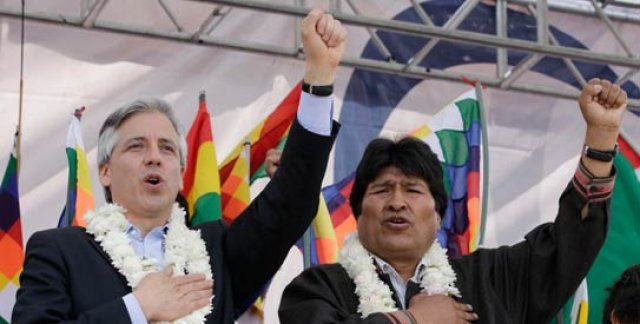
Bolivia’s vice-president Alvaro Garcia Linera brought a message of hope and anti-imperialist commitment to Mexico in early February.
Speaking to an overflowing assembly of students and university personnel at Mexico City’s UNAM (National Autonomous University), he said the left-wing government led by President Evo Morales welcomes social-movement protests and conflict. The more, the better.
“The struggle is our nourishment, our peace,” Garcia Linera said. “It does not overwhelm us. Absolute calm frightens us.
“Our opponents believe the struggle will wear us down. On the contrary, it nourishes us.”
The UNAM’s Economics Research Institute sponsored the vice-president’s address on “Bolivia: Achievements and Challenges of Transformation”.
Garcia Linera described Bolivia’s Movement toward Socialism (MAS) administration as a “government of social movements”. Nevertheless, he recognised that in the past three years “tensions” have arisen between the government and social movements.
These reflect tensions between the need for industrialisation and for protecting the environment, and between collective social needs and particular corporatist or sectoral interests.
Garcia Linera said: “I am not complaining. I am merely describing what is happening in a revolutionary process.
“We have chosen to ride these contradictions, always keeping this in mind — everything that favours the broad masses is suitable, everything that enables common action is suitable.
“Sometimes you stumble, and certainly over time other kinds of contradictions will emerge … [but] any revolutionary process stagnates if it does not have contradictions.”
The Mexican daily La Jornadafeatured an interview with Garcia Linera on February 7.
Journalist Luis Hernandez Navarro described the Bolivian vice-president as “one of today’s most important Latin American left intellectuals”.
Hernandez Navarro said: “He has theorised the Bolivian experience of transformation as no one has done, that is, with originality, depth and freshness. And today the Bolivian experience is an obligatory and ever stronger point of reference for the popular movement in Latin America.
“Garcia Linera has a profound but far from doctrinaire command of classical Marxism.”
Garcia Linera analyses the revolution under way in Bolivia as a “post-neoliberal” and “post-capitalist transition” led by its indigenous majority.
Today, he says, the “subjects of politics and the real institutions of power are now found in the indigenous, plebian arena. Today, the real power of the state is located within what were once called ‘conflict scenarios’ such as trade unions and communities. And those previously condemned to be silent subaltern subjects are today’s policy makers.”
Garcia Linera thinks the transformation under way in Bolivia is more profound than any previous revolutionary upsurge in his landlocked country.
How far can this emancipation struggle go? He believes the answer to that question is to be found not just in Bolivia, but in the interplay with other struggles throughout the continent.
“We place our hope of moving beyond capitalism in the expansion of agrarian and urban communitarianism, knowing that this is a universal task, not just that of a single country,” he said.
In that vein, he points to the need for revolutionary governments to ally regionally and act as supranational states, while always respecting national sovereignty and cultures.
[Reprinted from Axis of Logic, where a translated version Garcia Linera's interview can be found.]
